by Filippo Dionigi
While diplomatic delegations in Vienna meet for the first time since almost two years to address the Syrian situation, we must not forget that the refugee crisis caused by this conflict represents one of the most urgent issues to be addressed, both regionally and globally, writes Filippo Dionigi.
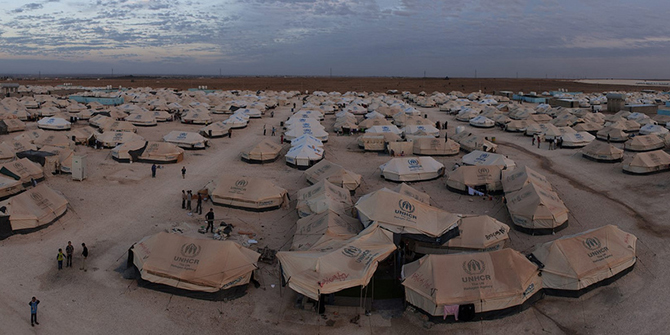
A multilateral cooperation framework among states, international organisations, global and local civil society, is an important instrument that should be strongly advocated for by all the stakeholders directly or indirectly affected by the refugee crisis. It should be considered as an essential component of the diplomatic talks on Syria and part of the solution to the problem.
In a recent conversation I had with a leading UN official with decades of experience in refugee crisis management, he referred to the idea of a ‘compact’, meaning a less formal and more fluid form of cooperation framework that can respond effectively and adaptively to a crisis in progress. Commonly, a compact is also characterised by the inclusion of private and civil society actors to facilitate a more direct social and political impact.
A multilateral agreement of this kind can produce the conditions for the enhanced protection of the lives of refugees currently in a very vulnerable situation. In addition, it can serve the interests of states like Turkey, Lebanon, Jordan, Iraq and others, which are hosting millions of forcibly displaced families and individuals. European countries and the EU should support the project of a functioning regional compact as a policy that – at least in part – addresses their otherwise disastrous approach to the situation.
This kind of cooperation framework has historical precedents which show a degree of success and feasibility. They are a lesson from which we can learn.
What would a compact look like?
In the Middle East, there are only few signatories to the 1951 Convention on the Status of Refugees and its 1967 Protocol. Therefore, in states like Lebanon, Jordan or Iraq, the legal status of refugees is almost non-existent, rendering them particularly vulnerable. Even in countries such as Turkey or Egypt that are signatories of the convention, refugee status is still highly problematic.
A regional compact can provide, first of all, a legal status for refugees that is officially recognised by all states’ party to the compact. Instead of falling into the bureaucratic and legal loopholes of whichever host state they end up in, forcibly displaced Syrians would be given a legal status that would be uniformly recognised by all host states, thus easing the management of the crisis.
Such a status should include the recognition of at least the most fundamental rights for refugees as stated by international customary law and international conventions, such as the principle of non-refoulement, the rights to asylum, shelter, health, freedom of movement, work and education.
Incentives for a regional compact
This may sound enormously ambitious (and indeed it is), but a regional compact should also establish structured incentives for cooperation among the stakeholders. International partners such as the EU, the Gulf states and Iran, but also global powers such as the US and Russia, have both the capacity and interest to set up incentives that would support the implementation of this regional compact. Neighbouring countries hosting refugees will be motivated by the possibility of ‘burden sharing’.
Even more could be done; for example, the establishment of a ‘refugees for development’ scheme. Host communities, such as those in Lebanon, Turkey, Jordan and Iraq, are under enormous infrastructural pressure, having to deal with a population that has doubled (and sometimes more than doubled) in some areas. I have visited several informal settlements and municipalities in Lebanon, for example, where, among other things, there were not enough trucks to collect garbage, the water supply was insufficient and insecure, electricity was scarce, and housing prices had increased beyond sustainable levels.
These problems did not begin with the refugee crisis; they are rather rooted in a long history of underdevelopment and inefficient policymaking by some of the host states. A regional global compact would serve the purpose of both providing protection for the rights and livelihood of refugees and also catalysing the resources, skills, and political interests to create an opportunity for development among local host communities, hence expanding their capacity for securing housing and services such as health, education, policing, or territorial management.
An effective cooperation regime, channelling resources in the right direction at the right time, would then turn the refugees’ presence into an opportunity for development. Projects such as new garbage treatment facilities, roads, electricity, water management, and well-planned housing -among other things – can become long-term economic assets for the development of new employment opportunities for both locals and refugees, but also providing long awaited services to local communities.

Another important incentive for states is that a working regional refugee compact would, from a longer-term perspective, constitute the founding framework for a smoother process of reintegration of refugees in their homeland, if and when they become able and willing to return.
A coordinated regional framework can more easily reconnect refugee communities across borders, thus facilitating their communication and contact. We do not know what the future of Syria is, but it is likely that its confessional, sectarian, tribal and political divisions (which now constitute the lines of the conflict) will become a serious obstacle for refugees to be able to access their places of origin or the country in general. These dynamics will hamper the possibility for Syrians to return to their homeland.
A regional compact, that is active even before the end of the conflict will constitute an important hub for cooperation and coordination between refugees, host states, and international organisations. It will allow the assessment of the modality and feasibility of the return of the displaced by facilitating the coordination of different groups across different states and territories.
Not only could a regional compact facilitate return, but it could also act as an administrative pivot to facilitate and coordinate the resettlement of those refugees who cannot return to Syria and instead opt for resettlement. This is an important resource because states like the UK seem to privilege resettlement from the region above dealing with the crisis at their borders or within the EU.
Finally, refugees are perceived (often wrongly) as causes of social and political instability. Being stability particularly valuable in the Middle East these days, a cooperative regional regime for refugee protection can become attractive by becoming a resource for the control and management of those factors related to mass displacement that may have the effect of heightening social and political tensions.
Along with responsibilities, therefore, a regional compact can also turn into a political opportunity for its stakeholders for more development support, cooperation on ‘burden sharing’, long-term coordination and further stability.
What would the role of international organisations be?
The UNHCR should act not as a mere tool but should instead show leadership in promoting its founding principles by sharing know-how and skills acquired through decades of crisis management with local governments and organisations.
It would be a mistake, nevertheless, to consider this an exclusive context for action by the UNHCR. If a ‘refugees for development’ scheme is to be implemented, agencies such as the UNDP, the World Bank, and regional as well as bilateral development organisations should be involved in the process of converting refugee presence into development opportunities.
One aspect worth emphasising is that much of the aid that refugees receive (it is difficult to quantify it due to its informal nature) is transferred through religious charitable channels. As long as we know that such channels are not politically problematic and are not a source of radicalisation, there should be a possibility to also cooperate with them.
Furthermore, the inclusion of civil society organisations and local administration in the compact should render cooperation with these actors more effective. Indeed entities such as municipalities and local host communities are those directly under the pressure of refugees’ presence and therefore should be fully included by international organisations as implementing partners.
Main challenges
The high-level UN official pointed out to me that these kind of initiatives are usually more successful when they take place at the end of a conflict and not during its development.
Needless to say, the Syrian conflict is far from its end. But it is nevertheless possible and indeed necessary to act now, to develop a realistic plan that does not ask of states more than what they can actually deliver with their own limited political, social, and economic structures. Although a regional compact may seem ambitious or even ‘wishful thinking’, the need and opportunity for this regional regime to materialise is urgent.
Another challenge will be the resistance from host states to accept responsibilities and obligations towards refugees. This is not surprising, of course, but as said above there are also incentives. Furthermore, the idea of a ‘compact’, a ‘regional regime’, or a ‘cooperation agreement’, instead of a more cumbersome ‘treaty’ entails a legal scheme of cooperation that is less coercive in its tone. Instead, it relies on a lighter and more responsive formula for mutual agreements based on interest and the genuine will to address a situation that, after all, is highly destabilising for all host states and the region in general. The inclusion of civil society and local administrations will also increase the accountability of states for their actions in managing the crisis and therefore will constitute another incentive to address the situation.
According to the UN official, there is no need to push for accession to the UN conventions formally, as this may come later, and a moderate dose of realism should be the modus operandi to set up this regime. As scholarly research has observed, typically it is from less formal schemes that more consolidated frameworks can emerge at a later stage.
Finally, regional cooperation in the Middle East does not have a good historical record. This is not an easy issue to overcome. Nevertheless, the highly humanitarian character of this specific crisis, the major interests involved in it and the possibility to gain a more respectable international reputation by becoming a party to the compact can become leverages for a regional agreement that, for once, may leave aside or at least decrease the political polarisation of this issue.
Practical issues a regional compact can address
The Syrian refugee crisis has enormously complex implications on social, political and economic levels. But there are a few aspects that are particularly worth mentioning. One is the fact that this crisis risks of creating another generation of stateless people in the region, with children born during displacement in host states that – in one way or another – are not allowed to register either in Syrian embassies or with local authorities.
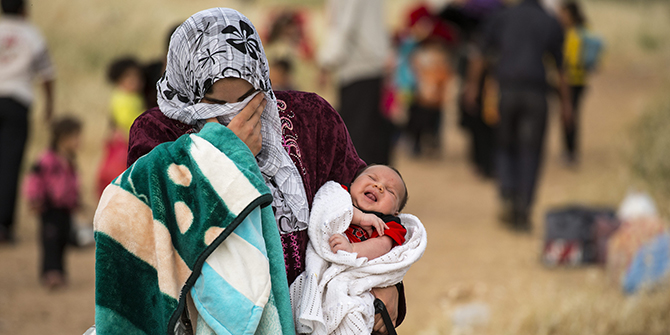
This is one of the emergencies that a regional compact can address by creating the wherewithal for the legal registration of newborns within camps and settlements. For example, it could allow the exceptional application of ius soli for the acquisition of a legal status to newborns, at least until the end of the conflict in Syria or until they are able to acquire full Syrian (or other) citizenship.
Another crucial aspect concerns the marriage of refugees to locals. There is no easily accessible data (or perhaps there is not data at all) on the topic, but I personally collected testimonies in Lebanon, and many colleagues have confirmed the same in Jordan and Turkey, that many Syrian families (especially the poorest) are often facilitating the marriage of Syrian girls and women at a very young age to locals. This allegedly provides a more secure future for the bride, but also constitutes a source of income for her family through financial settlements, and by outsourcing the maintenance of one family member.
A regional compact should establish the conditions for a more transparent and formalised system to regulate this practice, making it subject to human rights principles such as minimum age for marriage and respect for the will of those involved in the wedlock. Admittedly, religious authorities will staunchly oppose this project.
There is also the very important question of education. The Syrian refugee crisis interrupted the education of hundreds of thousands of children and students for years. Will they be able to go back to school? How?
A regional refugee protection compact would be an important asset in coordinating and standardising the didactic programmes of young students and facilitating access to these. Hence, when return or resettlement is agreed, these students will have comparable and recognised degrees, and can be more easily reintroduced into pre-existing or newly established educational systems. It may save years of lost education for a generation that is already paying an unjustly and enormously high price for the conflict.
Although the end of the Syrian conflict is not in sight, a regional compact for refugees’ protection could be an important instrument for limiting of the damage done by this conflict. It may seem ambitious, and indeed premature, but it is a fundamental policy option which is worth exploring further.
 Dr Filippo Dionigi is Leverhulme Early Career Fellow at the LSE Middle East Centre. He is currently organising a workshop to be held at LSE in June 2016 discussing forced displacement in the Middle East bringing together the policy, academia and civil society sectors.
Dr Filippo Dionigi is Leverhulme Early Career Fellow at the LSE Middle East Centre. He is currently organising a workshop to be held at LSE in June 2016 discussing forced displacement in the Middle East bringing together the policy, academia and civil society sectors.



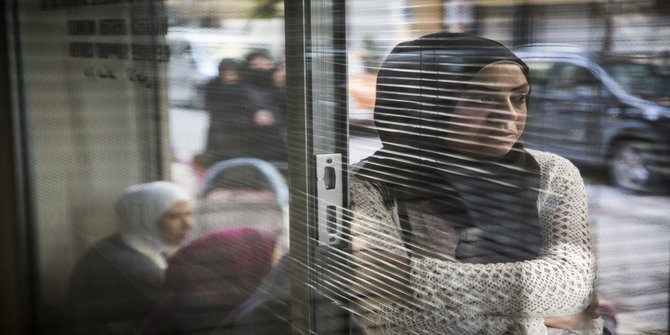
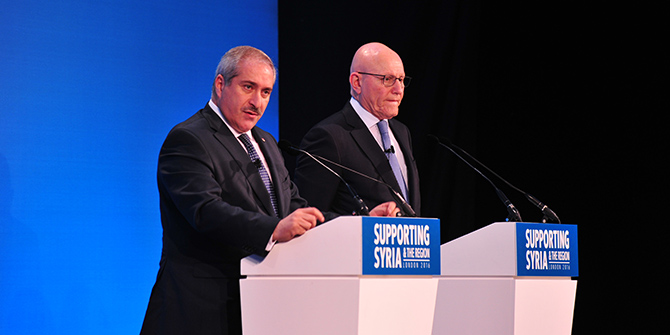
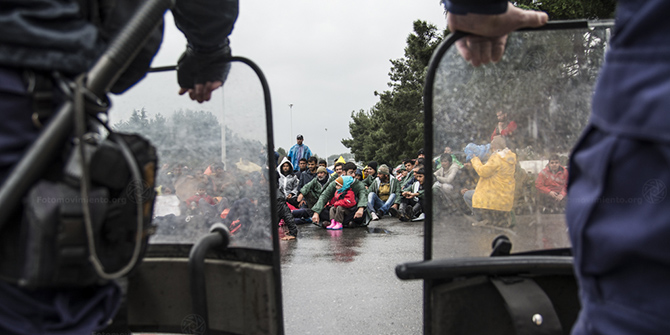
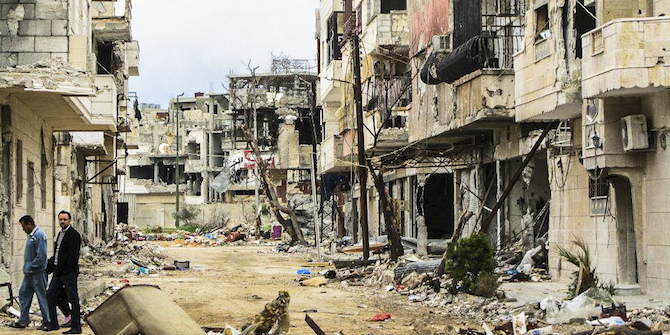
3 Comments